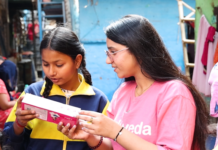Bangalore, September 20, 2016: With more than 1000 cases reported in Delhi till now, it has become extremely important to understand Chikungunya and its prevention. According to World Health Organization (WHO), the disease shares symptoms with dengue and can be easily misdiagnosed especially in areas where dengue is common.
“Chikungunya is characterized by an abrupt onset of fever frequently accompanied by joint pain. Other common signs and symptoms include muscle pain, headache, nausea, fatigue and rash. The joint pain is often very debilitating, but usually lasts for a few days or may be prolonged to weeks,” said Dr Narendra Prasad, consultant, General Medicines, Columbia Asia Hospital, Hebbal.
“Most patients recover fully, but in some cases joint pain may persist for several months, or even years. Occasional cases of eye, neurological and heart complications have been reported, as well as gastrointestinal complaints. Serious complications are not common, but in older people, the disease can rarely contribute to the cause of death. Often symptoms in infected individuals are mild and the infection may go unrecognized, or be misdiagnosed in areas where dengue occurs,” added the doctor.
The virus is transmitted from human to human by the bites of infected female mosquitoes. Most commonly, the mosquitoes involved are Aedesaegypti and Aedesalbopictus, two species which can also transmit other mosquito-borne viruses, including dengue. These mosquitoes can be found biting throughout daylight hours and are found biting outdoors, but Ae. aegypti will also readily feed indoors.
“After the bite of an infected mosquito, onset of illness occurs usually between 4 and 8 days but can range from 2 to 12 days. Serological tests, such as enzyme-linked immunosorbent assays (ELISA), can confirm the diagnosis with presence of IgM and IgG anti-chikungunya antibodies, “saidDr. Prasad.
The most common signs and symptoms of Chikungunya are:
- Flu- chills, fever, headache and aching joints
- Joint pain can particularly occur in hands, wrist, ankles and feet which can last from weeks to months and can even continue for a year
- Nausea
- Fatigue
- Rashes
“Treatment of chikungunya is directed primarily at relieving the symptoms, including joint pain and rehydration,” added the doctor.
Prevention and control relies heavily on reducing the number of natural and artificial water-filled container habitats that support breeding of the mosquitoes.
Here are a few tips by Dr Narendra Prasad to protect yourself from Chikungunya:
- Wear full length cloths to minimize skin exposure
- Apply skin repellents to exposed skin
- Use nets especially while sleeping during the day hours
- Don’t let water accumulate near your surroundings
- Check for overflowing garbage bins
- Empty flower vessels and change the water to avoid mosquito breeding
- Make sure the bathrooms are dry and toilet seats are down when not in use
- Mosquitos are generally attracted to smells like perfume and sweat. Shower to remove sweat and use unscented shampoos
- Spray mosquito repellent that contains DEET, if you have balcony garden or one in the veranda. You can grow marigold and lemon grass as they are natural insect repellent
- Use plug-in, smokeless mosquito repellent and Limit the use of smoke coils to outside or well ventilated indoor areas
Corporate Comm India(CCI Newswire)























